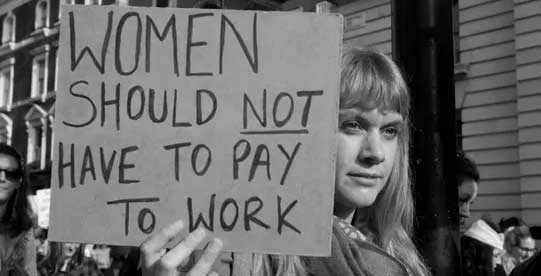

By Millie Collins
MORE THAN 12,000 people took to the streets across 11 major cities on 29 October to protest the extortionate cost of childcare, demanding much needed reforms to the archaic parental leave system—which Rishi Sunak disgracefully described as a ‘holiday’.
The ‘March of the Mummies’ was organised by Pregnant Then Screwed, a charity campaigning for good quality, affordable childcare for all, flexible working as the default, and ringfenced, properly funded parental leave.
The UK has the second highest childcare costs among leading economies. The average cost of childcare in the UK is £13,500 a year (£16,500 in London) for one child in full time nursery. These extortionate rates, added to the spiralling cost of living, are forcing more and more mothers to quit their jobs in order to look after their children.
Research conducted by PTS shows almost half of mothers are considering leaving their job due to childcare costs, while two-thirds say their childcare costs the same or more than their rent or mortgage. This is devastating the incomes of already squeezed working families, forcing more and more into poverty.
Government support is totally inadequate: 15 and 30 hours a week free to children aged 34, if you meet the stringent conditions, depending on your household income and the benefits you receive. Many parents fall through the cracks. In order to be eligible for 30 hours a week, both parents must be working and each earning a sufficient amount (£1,976 over three months for those aged 23 and over).
Additionally this support is available only during term time, yet many nurseries don’t offer term time only placements. Those that do are often chronically oversubscribed, underfunded and understaffed, resulting in a lower standard of care. Those parents who work and rely on the vouchers are forced to fork out money they don’t have or rely on the generosity of their relatives to provide childcare during the 98 days of school holidays.
Migrant workers are frequently denied this support, as eligibility is dependent on having a national insurance number, British or Irish citizenship or recourse to public funds. For those with children under three, government provision is non-existent for all but the very most impoverished.
The ‘free’ childcare provided by the government sounds generous in principle but in fact is woefully inadequate at just £5 an hour per child.
The lack of state funded places, combined with harsh government restrictions on support, means many parents go without. They have to choose between affording the basics necessities and sending their child to nursery.
The childcare system is in crisis and the government’s proposed ‘solution’ is absurd—allowing staff to look after five children over the age of two, rather than the four they’re allowed to now. But just 2% of nurseries, pre-schools and childminders say this would result in lower fees. Its only effect would be to reduce the standard of provision, increase the risk of accident and injury and raise the workload of an already stretched workforce.
Double shift
At the basis of the capitalist system lies a deeply rooted sexist ideology. This is based upon the expectation that the woman will take on unpaid domestic labour in the home, reproducing workers’ labour power so they can continue to produce profit for the capitalists.
As a result of the rising cost of living it is no longer possible to support a family on a single wage in most parts of the country. The ‘free’ childcare system is designed to encourage both parents to work. This results in a ‘double shift’ for working women: paid labour in the workplace, unpaid labour in the home.
Although we can and should fight for reforms and improvements to the childcare system under capitalism, the systemic bias against women will remain as long as capitalist production continues. The only system capable of eliminating this gender discrimination and providing the domestic support working women desperately need is socialism, a society based on democratic planning in the interests of the working class.